Birds of Fire
| Birds of Fire | ||||
|---|---|---|---|---|
 | ||||
| Studio album by | ||||
| Released | March 26, 1973[1] | |||
| Recorded | August 1972 | |||
| Studio | CBS Studios, New York Trident Studios, London | |||
| Genre | ||||
| Length | 39:53 | |||
| Label | Columbia/CBS | |||
| Producer | Mahavishnu Orchestra | |||
| Mahavishnu Orchestra chronology | ||||
| ||||
| Review scores | |
|---|---|
| Source | Rating |
| AllMusic | |
| Christgau's Record Guide | A−[3] |
| The Rolling Stone Jazz Record Guide | |
| Sputnikmusic | 5/5[4] |
| The Penguin Guide to Jazz Recordings | |
Birds of Fire is the second studio album by jazz fusion band the Mahavishnu Orchestra. It was released in 1973 by Columbia Records and is the last studio album released by the original line-up before it dissolved.
As with the group's previous album, The Inner Mounting Flame, Birds of Fire consists solely of compositions by John McLaughlin. These include the track "Miles Beyond (Miles Davis)", which McLaughlin dedicated to his friend and former bandleader.
The back cover of the album features the poem "Revelation" by Sri Chinmoy.
The track "Birds of Fire" was nominated for the 1974 Grammy for Best Pop Instrumental Performance.
Release history
[edit]In addition to the standard two-channel stereo album there was also a four-channel quadraphonic version released in 1973 on LP and 8-track tape. The quad LP was encoded in the SQ matrix format.
The first CD issue was in 1986. A remastered version of the album was released on CD in 2000 by Sony Music Entertainment. It features a new set of liner notes by JazzTimes critic Bill Milkowski, as well as photographs of the band. In 2015 the album was re-issued on Super Audio CD by Audio Fidelity containing both the stereo and quad mixes. The same content was re-issued on SACD in Japan in 2021 by Sony Music.
The track "Celestial Terrestrial Commuters" appears on the six-CD box set Jazz: The Smithsonian Anthology, released by Smithsonian Folkways in 2011, covering the history of jazz.[7]
Reception
[edit]Reviewing the album for All About Jazz in 2002, Walter Kolosky wrote of the title track:
"Birds of Fire," which opens up the album, is a fusion classic. John McLaughlin scares the hell out of his guitar with his melodic convulsions. If you ever want to frighten a musical neophyte, turn your stereo up really loud and play the cover tune – it's guaranteed to send him or her fleeing.[8]
Track listing
[edit]All tracks composed by John McLaughlin.
| No. | Title | Length |
|---|---|---|
| 1. | "Birds of Fire" | 5:50 |
| 2. | "Miles Beyond" (dedicated to Miles Davis) | 4:47 |
| 3. | "Celestial Terrestrial Commuters" | 2:54 |
| 4. | "Sapphire Bullets of Pure Love" | 0:24 |
| 5. | "Thousand Island Park" | 3:23 |
| 6. | "Hope" | 1:59 |
| No. | Title | Length |
|---|---|---|
| 7. | "One Word" | 9:57 |
| 8. | "Sanctuary" | 5:05 |
| 9. | "Open Country Joy" | 3:56 |
| 10. | "Resolution" | 2:09 |
Personnel
[edit]Musicians
[edit]- John McLaughlin – guitars
- Rick Laird – bass
- Billy Cobham – drums, percussion
- Jan Hammer – keyboards, Moog synthesizer, Fender Rhodes
- Jerry Goodman – violin
Technical
[edit]- Ken Scott, Jim Green – audio engineer
- Ashok (Chris Poisson) – album design
- Nathan Weiss – Management
- Pranavananda – photography
Charts
[edit]| Chart (1973) | Peak position |
|---|---|
| Australian Albums (Kent Music Report)[9] | 38 |
| Canada Top Albums/CDs (RPM)[10] | 5 |
| Finnish Albums (The Official Finnish Charts)[11] | 16 |
| German Albums (Offizielle Top 100)[12] | 29 |
| Norwegian Albums (VG-lista)[13] | 18 |
| UK Albums (OCC)[14] | 20 |
| US Billboard 200[15] | 15 |
Certifications
[edit]| Region | Certification | Certified units/sales |
|---|---|---|
| United States (RIAA)[16] | Gold | 500,000^ |
|
^ Shipments figures based on certification alone. | ||
References
[edit]- ^ "Birds Of Fire". Spotify. Sony Music Entertainment Inc. Retrieved December 13, 2023.
- ^ Ginell, Richard S.. Birds of Fire at AllMusic
- ^ Christgau, Robert (1981). "Consumer Guide '70s: M". Christgau's Record Guide: Rock Albums of the Seventies. Ticknor & Fields. ISBN 089919026X. Retrieved March 2, 2019 – via robertchristgau.com.
- ^ Fisher, Tyler. "Mahavishnu Orchestra – Birds of Fire (album review 3) | Sputnikmusic". sputnikmusic.com. Retrieved 1 January 2014.
- ^ Swenson, J., ed. (1985). The Rolling Stone Jazz Record Guide. USA: Random House/Rolling Stone. p. 135. ISBN 0-394-72643-X.
- ^ Cook, Richard; Morton, Brian (2008). The Penguin Guide to Jazz Recordings (9th ed.). Penguin. p. 922. ISBN 978-0-141-03401-0.
- ^ "Jazz: The Smithsonian Anthology". AllMusic. Retrieved 9 September 2022.
- ^ Kolosky, Walter (16 November 2002). "Mahavishnu Orchestra: Birds of Fire". All About Jazz. Retrieved 28 June 2018.
- ^ Kent, David (1993). Australian Chart Book 1970–1992 (illustrated ed.). St Ives, N.S.W.: Australian Chart Book. ISBN 0-646-11917-6.
- ^ "Top RPM Albums: Issue 4828". RPM. Library and Archives Canada. Retrieved October June 15, 2024.
- ^ Pennanen, Timo (2006). Sisältää hitin – levyt ja esittäjät Suomen musiikkilistoilla vuodesta 1972 (in Finnish) (1st ed.). Helsinki: Kustannusosakeyhtiö Otava. ISBN 978-951-1-21053-5.
- ^ "Offiziellecharts.de – Mahavishnu Orchestra – Birds of Fire" (in German). GfK Entertainment Charts. Retrieved October June 15, 2024.
- ^ "Norwegiancharts.com – Mahavishnu Orchestra – Birds of Fire". Hung Medien. Retrieved October June 15, 2024.
- ^ "Official Albums Chart Top 100". Official Charts Company. Retrieved October June 15, 2024.
- ^ "Mahavishnu Orchestra John McLaughlin Chart History (Billboard 200)". Billboard. Retrieved October June 15, 2024.
- ^ "American album certifications – Mahavishnu Orchestra – Birds of Fire". Recording Industry Association of America.
